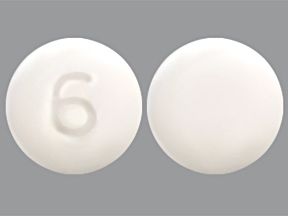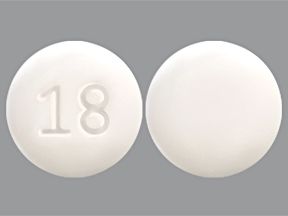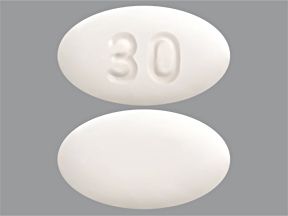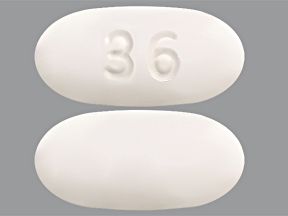Emflaza (deflazacort) is a brand-name drug prescribed for Duchenne muscular dystrophy in adults and some children. Emflaza comes as an oral tablet and oral liquid suspension. It’s typically taken once per day.
Emflaza belongs to a drug class called corticosteroids. It’s a prodrug, which means it becomes active after your body breaks it down. Emflaza isn’t available in a generic version.
For information about the dosage and administration of Emflaza, including its strengths and how to take the drug, keep reading. For a comprehensive look at Emflaza, see this article.
Note: This article describes typical dosages for Emflaza provided by the drug’s manufacturer. When taking Emflaza, always follow the dosage prescribed by your doctor.
Read on to find out about what forms Emflaza comes in, as well as its strengths and typical dosages.
Emflaza forms
Emflaza comes as an oral tablet and an oral liquid suspension.
Emflaza strengths
Emflaza oral tablets come in four strengths:
- 6 milligrams (mg)
- 18 mg
- 30 mg
- 36 mg
The oral liquid suspension form of Emflaza comes in one strength: 22.75 mg per milliliter (mg/mL).
Typical dosages
Because Emflaza’s dosing is based on your body weight in kilograms (kg), there is no “typical” dosage for Emflaza. (For reference, 1 kg is about 2.2 pounds [lb].) Emflaza’s dosage is 0.9 mg/kg of body weight, taken once per day. Your doctor will ultimately prescribe the smallest dosage that provides the desired effect.
The following information describes dosages that are commonly used or recommended. However, be sure to take the dosage amount your doctor prescribes for you. Your doctor will determine the best dosage to fit your needs.
Dosage for Duchenne muscular dystrophy
The dosage of Emflaza for Duchenne muscular dystrophy is 0.9 mg/kg of body weight, taken once per day. Your doctor will use this formula to determine your dose. The same formula is used to determine the dosage for children and adults. See the following dosage chart by weight for examples of possible dosages of Emflaza:
| Body weight in pounds (lb) | Body weight in kilograms (kg) | Emflaza dosage | Tablet dosage directions* |
| 25 lb | about 11 kg | 9.9 mg | take two 6-mg tablets once per day |
| 70 lb | about 32 kg | 28.8 mg | take one 30-mg tablet once per day |
| 140 lb | about 64 kg | 57.3 mg | take two 30-mg tablets once per day |
* Dosage is rounded up based on available tablet strength. For the oral liquid suspension, dosage is rounded up to the nearest tenth of a mL.
Children’s dosage
Emflaza is approved by the FDA for children ages 2 years and older. The dosage for children is determined using the same formula as the dosage for adults. See “Dosage for Duchenne muscular dystrophy” above.
Long-term treatment
Emflaza is meant to be a long-term treatment. If you and your doctor determine that Emflaza is safe and effective for you, you’ll likely take it long term.
Read on to find some commonly asked questions and answers about Emflaza and its dosage.
Will my doctor adjust my dosage if I experience anxiety as a side effect of Emflaza?
Anxiety is a possible side effect of Emflaza and other steroid medications. This side effect was reported during post-marketing studies of the drug.
Prescription medications are thoroughly tested before they’re approved to make sure they’re safe and effective. Once they’re on the market, the drug manufacturers continue to gather information about possible side effects and reactions that may happen. This is known as post-marketing experience.
If you develop anxiety while taking Emflaza, talk with your doctor about how you can manage this side effect.
Is there a dosage calculator for Emflaza?
The recommended dosage of Emflaza is 0.9 milligrams (mg) per kilogram (kg) of body weight, taken once per day. (For reference, 1 kg is about 2.2 pounds [lb].) You don’t need to calculate your own dosage. Your doctor will determine the best dosage for you.
If you have questions about your dosage of Emflaza, talk with your doctor.
The Emflaza dosage your doctor prescribes will depend on several factors. These include:
- the form of Emflaza you take
- your body weight, which may change over time
- other medications you may take
Other medical conditions you have can also affect your Emflaza dosage.
Emflaza should be taken once per day with or without food. The tablets should be swallowed whole. If you have trouble swallowing Emflaza tablets, you can crush them and mix the crushed tablets with applesauce just before swallowing.
Do not take Emflaza with grapefruit juice. Grapefruit may increase your risk of side effects from Emflaza.
If your doctor prescribes Emflaza oral liquid suspension:
- Shake the bottle well.
- Use the oral dispenser that comes with Emflaza to measure your dose.
- You may mix your dose with 3 to 4 ounces of juice (except for grapefruit juice) or milk and immediately drink it.
- The suspension expires 30 days after opening it. Throw away any leftover Emflaza after 30 days.
If you have trouble swallowing tablets, see this article for tips on how to take this form of medication. You can also talk with your doctor or pharmacist.
ACCESSIBLE DRUG LABELS AND CONTAINERSSome pharmacies offer labels with large print, braille, or a code you scan with a smartphone to convert text to speech. If your local pharmacy doesn’t have these options, your doctor or pharmacist might be able to recommend a pharmacy that does.
If you’re having trouble opening medication bottles, ask your pharmacist about putting Emflaza in an easy-open container. They also may recommend tools that can make it easier to open bottles.
If you miss a dose of Emflaza, take it as soon as you remember. Try to take your doses around the same time each day. This helps maintain a steady level of the drug in your body so Emflaza can work effectively. If you have questions about missing a dose, talk with your doctor or pharmacist.
To help make sure that you don’t miss a dose, try using a medication reminder. This can include setting an alarm or using a timer. You could also download a reminder app on your phone.
It’s important that you do not take more Emflaza than your doctor prescribes. For some medications, taking more than the recommended amount may lead to side effects or overdose.
If you take more than the recommended amount of Emflaza
Call your doctor right away if you believe you’ve taken too much Emflaza. Another option is to call America’s Poison Centers at 800-222-1222 or use its online tool. If you have severe symptoms, immediately call 911 or your local emergency number, or go to the nearest emergency room.
Emflaza, like other steroid drugs, may cause withdrawal symptoms if you stop taking it abruptly. Symptoms of withdrawal include:
- loss of appetite
- nausea and vomiting
- fatigue
- headache
- fever
- joint or muscle pain
- weight loss
If you need to stop taking Emflaza, your doctor will likely taper your dosage. This means you’ll take a smaller amount of Emflaza for a while, rather than stopping it completely. If you have questions about stopping Emflaza, talk with your doctor.
The dosages in this article are typical dosages provided by the drug’s manufacturer. If your doctor recommends Emflaza for you, they’ll prescribe the dosage that’s right for you. Always follow the dosage that your doctor prescribes.
As with any drug, never change your dosage of Emflaza without your doctor’s recommendation. If you have questions about the dosage of Emflaza that’s best for you, talk with your doctor.
Besides learning about dosage, you may want other information about Emflaza. These additional articles might be helpful:
- More about Emflaza. For information about other aspects of Emflaza, refer to this article.
- Details about Duchenne muscular dystrophy (DMD). For details about this condition, see our list of articles related to DMD.
Disclaimer: Medical News Today has made every effort to make certain that all information is factually correct, comprehensive, and up to date. However, this article should not be used as a substitute for the knowledge and expertise of a licensed healthcare professional. You should always consult your doctor or another healthcare professional before taking any medication. The drug information contained herein is subject to change and is not intended to cover all possible uses, directions, precautions, warnings, drug interactions, allergic reactions, or adverse effects. The absence of warnings or other information for a given drug does not indicate that the drug or drug combination is safe, effective, or appropriate for all patients or all specific uses.




